This video is part of the open course “Neuroscience for machine learners”. Find out more at https://neuro4ml.github.io/
Category: computing – Page 310
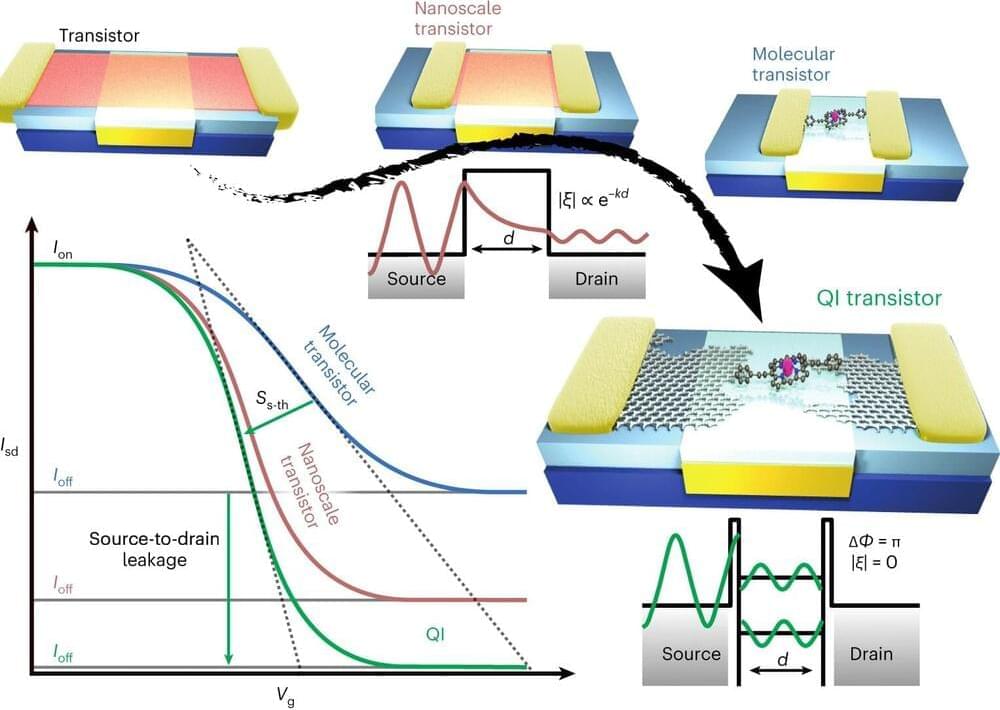
Quantum interference could lead to smaller, faster, and more energy-efficient transistors
As transistors get smaller, they become increasingly inefficient and susceptible to errors, as electrons can leak through the device even when it is supposed to be switched off, by a process known as quantum tunneling. Researchers are exploring new types of switching mechanisms that can be used with different materials to remove this effect.
In the nanoscale structures that Professor Jan Mol, Dr. James Thomas, and their group study at Queen Mary’s School of Physical and Chemical Sciences, quantum mechanical effects dominate, and electrons behave as waves rather than particles. Taking advantage of these quantum effects, the researchers built a new transistor.
The transistor’s conductive channel is a single zinc porphyrin, a molecule that can conduct electricity. The porphyrin is sandwiched between two graphene electrodes, and when a voltage is applied to the electrodes, electron flow through the molecule can be controlled using quantum interference.
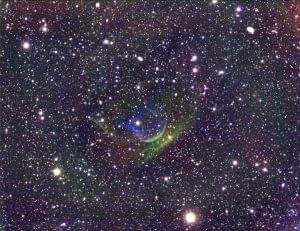
Condor Telescope reveals a New World for Astrophysicists
A new telescope called the “Condor Array Telescope” may open up a new world of the very-low-brightness universe for astrophysicists. Four new papers, published back to back in the Monthly Notices of the Royal Astronomical Society (MNRAS) this month, present the first scientific findings based on observations acquired by Condor. The project is a collaborative led by scientists in the Department of Physics and Astronomy at Stony Brook University and the American Museum of Natural History (AMNH).
According to lead researchers Kenneth M. Lanzetta, Ph.D., a Professor in the Department of Physics and Astronomy and Stefan Gromoll of Stony Brook, and Michael M. Shara, Ph.D., Curator in the Department of Astrophysics at the AMNH, Condor is now in full operation. The new “array telescope” uses computers to combine light from several smaller telescopes into the equivalent of one larger telescope and is able to detect and study astronomical features that are too faint to be seen with conventional telescopes.
In the first paper, Lanzetta and colleagues used Condor to study extremely faint “stellar streams” surrounding the nearby galaxy NGC 5,907, a well-known spiral galaxy located some 50 million light years from Earth.

Video Shows First Neuralink Patient Playing Mario Kart With His Mind
The first patient with a Neuralink brain-computer implant played Nintendo’s Mario Kart video game with his mind in an impressive new demo video, calling it “lifechanging” at a company-wide meeting that was posted Friday on the social media platform X-formerly-Twitter.
“It’s been a wild ride,” said Noland Arbaugh, the 29-year-old Neuralink patient, during the celebratory company meeting.
“This is going to change the world,” added Arbaugh, who’s quadriplegic, meaning he’s paralyzed below his neck from a swimming accident, and requires the use of a wheelchair.
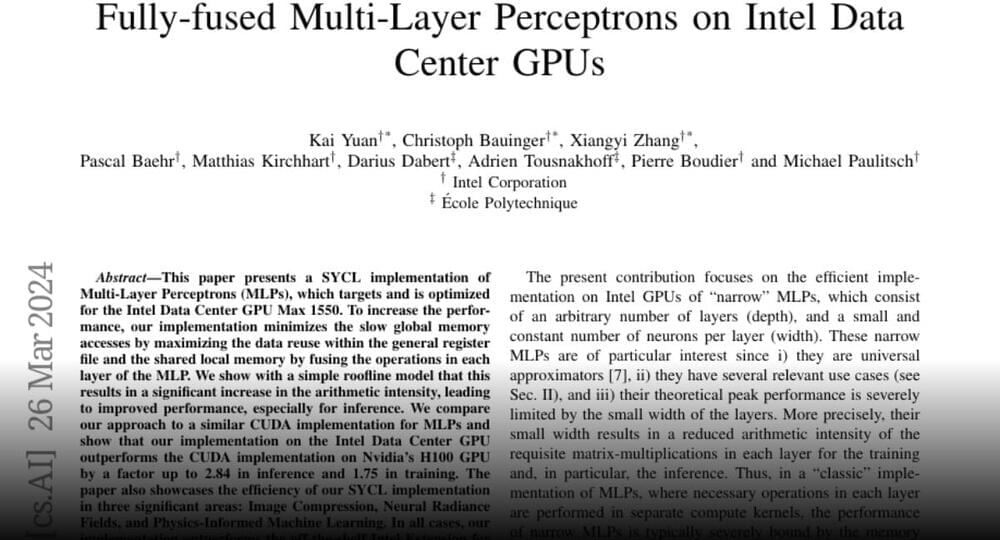
Fully-fused Multi-Layer Perceptrons on Intel Data Center GPUs
Intel announces Fully-fused Multi-Layer Perceptrons on Intel Data Center GPUs https://huggingface.co/papers/2403.
This paper presents a SYCL implementation of Multi-Layer Perceptrons (MLPs), which targets and is optimized for the Intel Data Center GPU Max 1550.
Join the discussion on this paper page.

First Human Patient to Receive a Neuralink Brain Implant Used it to Stay Up All Night Playing Civilization 6
The first human recipient of a Neuralink brain implant has shared new details on his recovery and experience of living with the experimental assistive tech, which has allowed him a greater level of freedom and autonomy, including the ability to pull an all-nighter playing Sid Meier’s Civilization 6.
Neuralink co-founder Elon Musk took to X/Twitter in January to reveal that the company had implanted its first brain-computer interface in the head of a human patient, who was “recovering well” following the surgery. The billionaire also hinted at the time that the implant was functioning well and had detected a “promising neuron spike”. In a subsequent February update, Musk commented that the unnamed patient had seemingly made a full recovery, and was even able to use the implant to manipulate a computer cursor with thought alone.
Finally, on March 20, Neuralink posted its own update to X in the form of a nine-minute livestream in which 29-year-old implant recipient Noland Arbaugh used the technology to play a digital version of chess, while discussing how living with the experimental aide had changed his life.
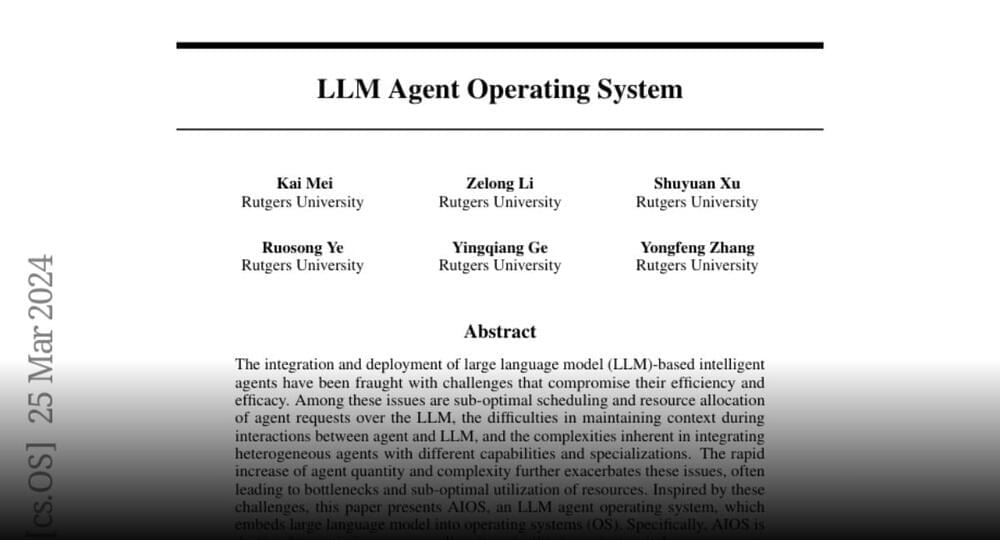
LLM Agent Operating System
https://huggingface.co/papers/2403.
The integration and deployment of large language model (LLM)-based intelligent agents have been fraught with challenges that compromise their efficiency and efficacy.
Join the discussion on this paper page.
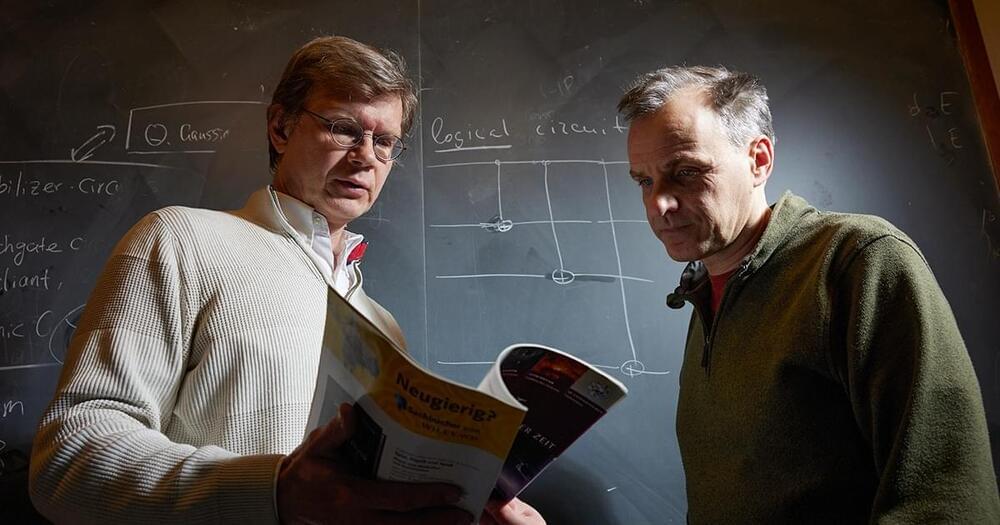
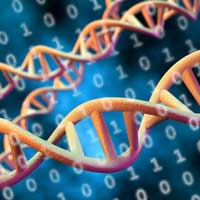
Translation software enables efficient DNA data storage
In support of a major collaborative project to store massive amounts of data in DNA molecules, a Los Alamos National Laboratory–led team has developed a key enabling technology that translates digital binary files into the four-letter genetic alphabet needed for molecular storage.
“Our software, the Adaptive DNA Storage Codec (ADS Codex), translates data files from what a computer understands into what biology understands,” said Latchesar Ionkov, a computer scientist at Los Alamos and principal investigator on the project. “It’s like translating from English to Chinese, only harder.”
DNA offers a compact way to store huge amounts of data cost-effectively. Los Alamos National Laboratory has developed ADS Codex to translate the 0s and 1s of digital computer files into the four-letter code of DNA.
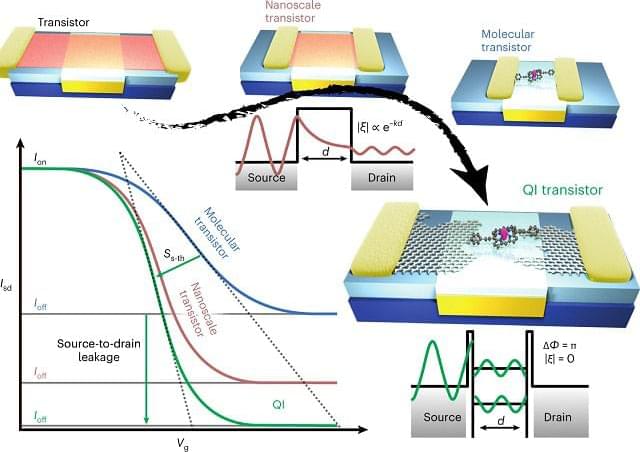
Researchers develop new single-molecule transistor that uses quantum interference
An international team of researchers from Queen Mary University of London, the University of Oxford, Lancaster University, and the University of Waterloo have developed a new single-molecule transistor that uses quantum interference to control the flow of electrons. The transistor, which is described in a paper published in the Nature Nanotechnology (“Quantum interference enhances the performance of single-molecule transistors”), opens new possibilities for using quantum effects in electronic devices.
Transistor are the basic building blocks of modern electronics. They are used to amplify and switch electrical signals, and they are essential for everything from smartphones to spaceships. However, the traditional method of making transistors, which involves etching silicon into tiny channels, is reaching its limits.
As transistors get smaller, they become increasingly inefficient and susceptible to errors, as electrons can leak through the device even when it is supposed to be switched off, by a process known as quantum tunnelling. Researchers are exploring new types of switching mechanisms that can be used with different materials to remove this effect.